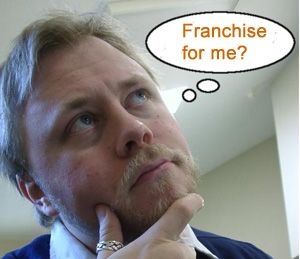
I started playing golf about 10 years ago and over time have come to love the game. Although technique is a large part of what drives many golfers back to the greens, golf also has a very specific set of rules that define the game and create an equal playing field. The rules spell out how to play, how to keep score and how to determine a winner.
Franchising, too, has a set of rules, and these rules are manifested in a document called the Uniform Franchise Offering Circular (UFOC). Each prospective franchisee of every franchise company in the U.S. will receive this document as a requirement of the Federal Trade Commission. Effective since 1979, the stated purpose of the FTC rule is:
“The Rule is designed to enable potential franchisees to protect themselves before investing by providing them with information essential to an assessment of the potential risks and benefits, to make meaningful comparisons with other investments, and to further investigation of the franchise opportunity.”
In other words, the UFOC should provide you with enough information to be able to make an informed decision about purchasing the franchise. The UFOC serves as a protection for the individual against making a decision based on information not supported by fact and should be read carefully by each and every woman looking at buying a franchise as it contains such “need to know” items as the costs and fees involved, any litigation history of the franchisor and much more.
The FTC Rule requires franchisors to provide the UFOC to the prospective franchisee at the earlier of the first personal meeting or 10 business days before the franchisee signs an agreement or pays any money. (The UFOC will probably contain a receipt for you to sign and date, to show they have complied with this rule.) It also provides that the franchise agreement must be given to the prospective franchisee at least five business days before the franchisee signs any agreement or pays any money. A franchisor’s UFOC must be updated on an annual basis, or sooner if certain conditions are met.
Here are some of the items a UFOC must contain:
• History and Experience. The franchisor must provide you with a history of their past activities, especially as it may relate to potentially negative information. This information must be provided not only for the company itself as well as for its predecessors and affiliates but also for the officers and directors. The information includes factors like the business experience of the company and its principles and any fairly recent litigation or bankruptcy history for either.
• Financial Factors. The company must disclose to you the relevant financial terms of the franchise opportunity. This would include the initial franchise fees, other startup costs, and an investment range estimate for your total cost to get into the business. The UFOC must also disclose any other fees, such as the royalty, marketing and renewal fees that the franchisee will have to pay throughout the life of their franchise.
• Obligations and Restrictions. The company must disclose the obligations of both you and the company under the terms of the franchise agreement. They must also spell out any mandated restrictions that you will operate under in terms of your purchasing options and behavior as a franchisee. This may include such items as site selection and development, training, trademarks, customer service, advertising, personnel, territory, reporting and dispute resolution.
• Earnings Claims. FTC rules leave it up to the franchisor whether they want to supply information about the earnings that can be achieved in their business. If a franchisor does want to provide earnings claims, they must follow stringent rules on how this information can be given to a prospective franchisee. It is essential for the franchisor to make sure that the data provided is as accurate and representative as possible and they must also clearly label any assumptions or qualifications on the data provided. As a result, earnings claims can take a variety of angles and approaches, so reviewing the background information is vital.
• Exhibits. The company must also provide other data including audited financial statements, current franchisee lists with contact information, contracts and receipts. Item XX, information regarding franchisees of the company, is particularly important to you as you will be calling a number of these franchisees to learn about the business from the franchisee point of view. Item XXII contains the Franchise Agreement, which you will want to review with your franchise attorney before signing.
Individual State Requirements
In addition to the laws that mandate disclosure, there are also some states that have passed specific laws to further protect franchisees in that state. These laws may add additional disclosures or rules about franchise agreement terms. As an example of this, there are a number of states that require that the legal venue for any dispute must be in their state rather than in the state where the franchise company is located. These types of additional requirements vary from state to state but any that are appropriate to your situation in your state should be disclosed in the UFOC you receive.
Your responsibility
The most important point to remember regarding the UFOC is that you need to read and understand the material that the franchisor is disclosing to you. The FTC has a requirement that these documents must be presented in understandable English so that the material should be clear. It won’t make any difference, however, if you don’t carefully review the material. After you have read the document, you may want to have your attorney go through the paperwork as well.
Make sure you take the time to study the information supplied to you and you’ll have a much better chance of making sure that these legal requirements actually serve their purpose of protecting or safeguarding your interests. Just as a good SCRABBLE® player knows the 16 words that use a Q but don’t need the U, and that playing a 7-letter word like “qindars” will gain her 50 bonus points, those who read and understand the rules of the UFOC are also likely to be ahead in the game.
 Kim Ellis is the President of Bison.com, a leading online resource for franchise and business opportunities. She has been quoted as an industry expert in USA Today, Wall Street Journal and a variety of local and regional publications regarding trends in business and franchising. Kim combines her entrepreneurial spirit with a diverse background in marketing and operation to help others succeed in franchising.
Kim Ellis is the President of Bison.com, a leading online resource for franchise and business opportunities. She has been quoted as an industry expert in USA Today, Wall Street Journal and a variety of local and regional publications regarding trends in business and franchising. Kim combines her entrepreneurial spirit with a diverse background in marketing and operation to help others succeed in franchising.






